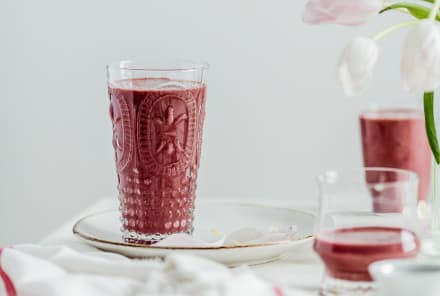Advertisement
How Much Booze Do You Have To Drink To Mess With Your Hormones?

We all love to unwind at the end of the day. Sometimes that’s a great bout of yoga or high-intensity training, and sometimes it's a glass of wine or a favorite cocktail. Everything in moderation, right?
Or not? Have you ever wondered what impact (if any) alcohol has on your hormones? And just how much is too much? Is any amount "safe"? What is alcohol doing inside our bodies? And what does moderate consumption even mean?
To answer those questions, let’s take it one step at a time.
Alcohol consumption can increase estrogen—but it's not the same for everyone.
According to clinical studies, moderate alcohol consumption can vary with life stages. What you consume at age 20 may not be the same as what you consume at age 40—and what you drink will affect your hormones really differently as well. As a woman ages, her hormones fluctuate; therefore, less alcohol is needed to have larger hormonal effects over time. For a woman in her 40s or 50s, even "moderate" amounts of alcohol can affect the hormonal system.
Drinking alcohol can cause a rise in estrogen and a decrease in progesterone in premenopausal women. Some studies1 even suggest that menopause was delayed by moderate alcohol consumption, since "alcohol consumption was significantly correlated with estrogen levels." Though binge drinking (five or more drinks in one day) is the most detrimental, in terms of hormonal disruption and other health problems, this study suggests that moderate alcohol consumption needs further analysis to determine its health impact.
Alcohol consumption can decrease testosterone—but it depends how much you drink.
According to a study by the Testosterone Centers of Texas, "alcohol is the enemy of testosterone." Testosterone is important for both men and women (although men have much more)! It’s well-known as the hormone for sex drive and libido, but it is a key player in muscle formation, bone mass, fat distribution, and brain health. Low testosterone (caused by alcohol or something else) in both men and women can result in brain fog, fatigue, irritability, lower muscle mass, and lower motivation.
The Testosterone Centers study goes on to cite that the decrease in testosterone is in direct relation to the amount of alcohol consumed, which poses the question: How much is too much?
In this particular study, the findings suggest that drinking two to three beers a day caused a "slight" reduction in testosterone for men and none for women, a good sign that moderate drinking doesn't have that huge of an impact. The way in which alcohol affects hormone levels is related to the chemicals alcohol contains. Beer and wine contain chemicals that can increase estrogen, thereby lowering testosterone.
Heavy drinking (more than three drinks a day) is the real culprit for all kinds of health maladies in both men and women: weight gain, lowered testosterone levels in men, and increased testosterone levels in women. Both sexes are affected in terms of fertility. Studies have shown that men who drink in excess suffer from both fertility and "abnormally low testosterone."
How to balance drinking with a healthy lifestyle.
Though most studies seem to suggest moderate alcohol intake may not cause any health issues in men and women, I've found in my years as a practitioner that "moderate" can mean very different things to different people.
The best solution? Consult with your health care provider to:
- Determine a baseline for your health.
- Talk to (and trust) your doctor to let her or him know your accurate alcohol intake on a weekly basis.
- Follow-up, on a regular basis, about how that intake may be or may not be affecting your health.
The bottom line: What’s moderate and appropriate for you might not be the same as what’s moderate and appropriate for me—especially when it comes to hormone balance.
If you want to learn more about eating (and drinking!) for hormone balance from Dr. Shah, be sure to check out mbg's new functional nutrition program!

Dr. Amy Shah is a double board certified MD with training from Cornell, Columbia and Harvard Universities. She was named one of mindbodygreen's Top 100 Women In Wellness to Watch in 2015 and has been a guest on many national and local media shows. She helps busy people transform their health by reducing inflammation and eating more plants, utalizing the power of the microbiome to help digestion, natural hormone balance and food sensitivities. She is an expert on intermittent fasting for women and has a 2 week guided group program.
More from the author:
Functional Nutrition Training
Check out Functional Nutrition Coaching
A cutting-edge nutrition deep dive taught by 20+ top health & wellness experts
Learn moreMore from the author:
Functional Nutrition Training
Check out Functional Nutrition Coaching
A cutting-edge nutrition deep dive taught by 20+ top health & wellness experts
Learn more
Dr. Amy Shah is a double board certified MD with training from Cornell, Columbia and Harvard Universities. She was named one of mindbodygreen's Top 100 Women In Wellness to Watch in 2015 and has been a guest on many national and local media shows. She helps busy people transform their health by reducing inflammation and eating more plants, utalizing the power of the microbiome to help digestion, natural hormone balance and food sensitivities. She is an expert on intermittent fasting for women and has a 2 week guided group program.


















